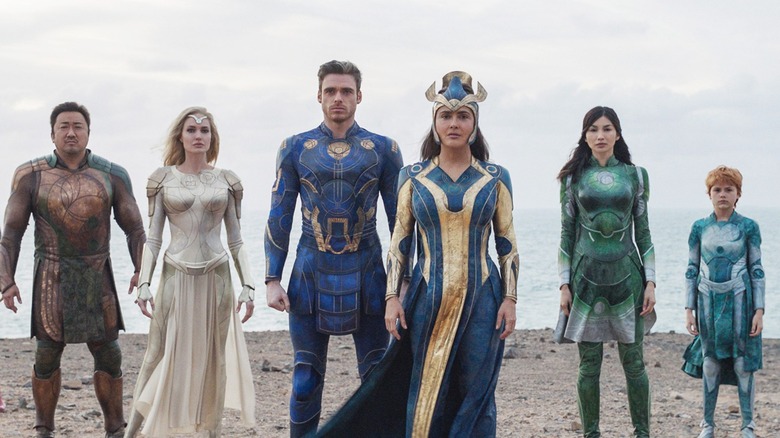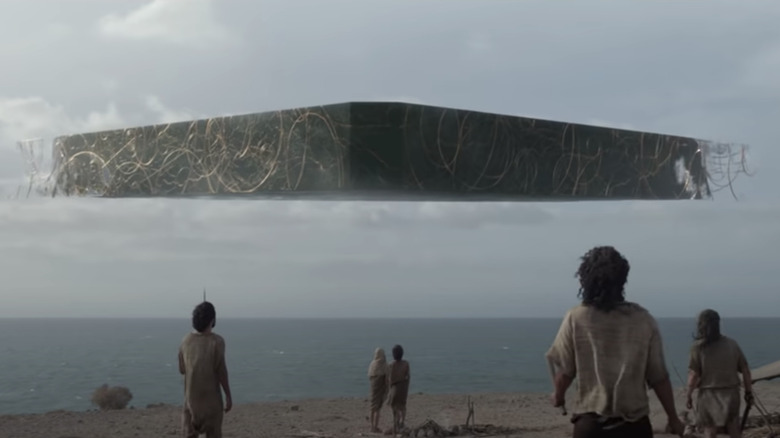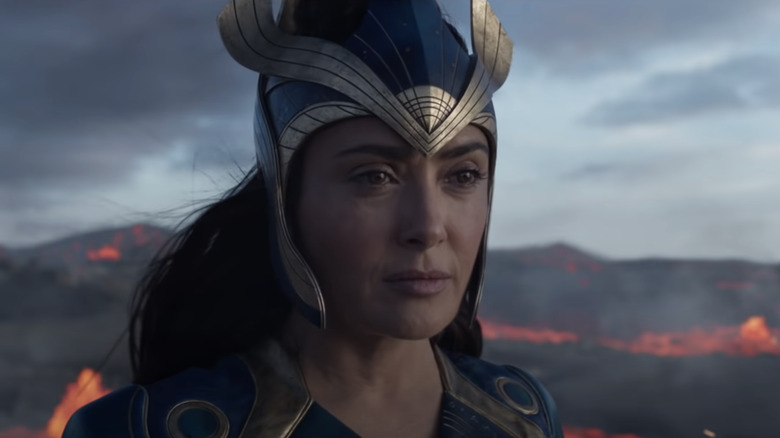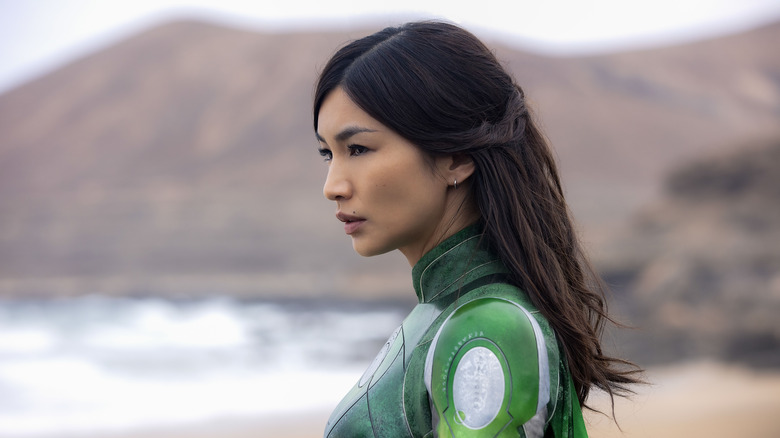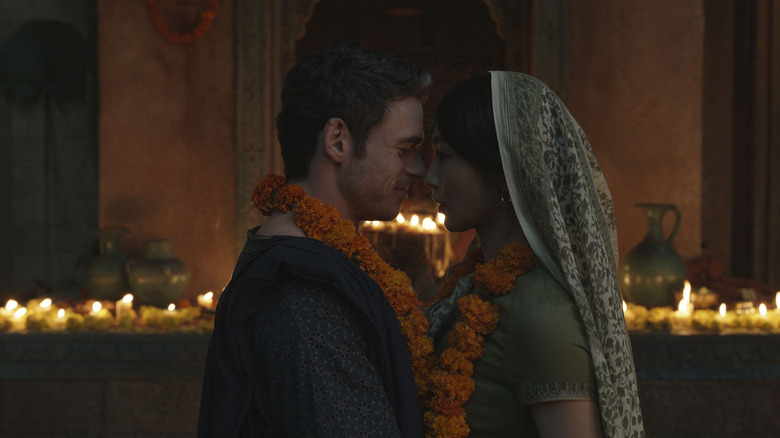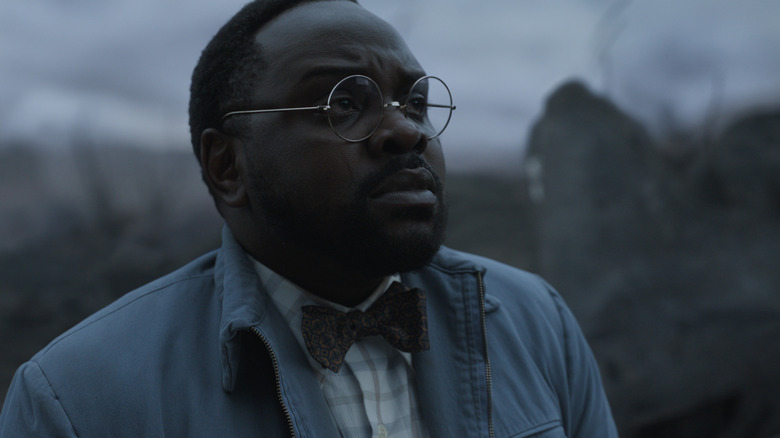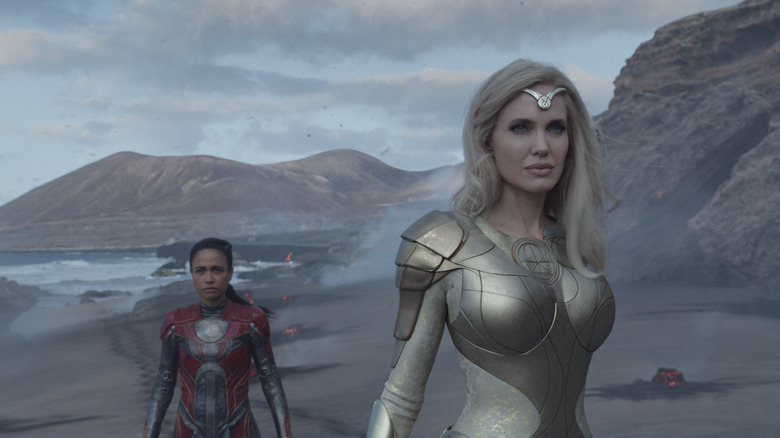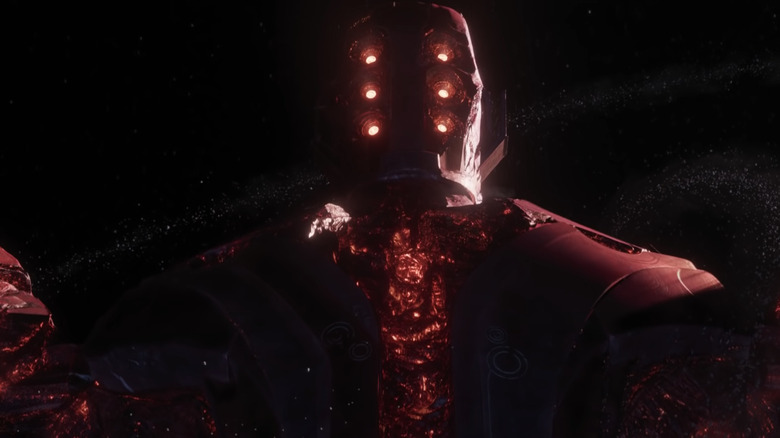Eternals Spoiler Review: A Cosmic Superhero Family Dispute Where It's Complicated, Real Complicated
This review contains major spoilers for "Eternals."
Marvel's "Eternals" opens with the biblical words, "In the beginning..." and what follows is a 157-minute film that reframes human history and life on Earth as the birth pangs of a godlike Celestial named Tiamut. Our overpopulated planet is a cocoon for Tiamut, and when he's born, Earth will be destroyed, but the death and rebirth cycle of Celestials will ensure that new worlds live elsewhere in the cosmos.
"Eternals" retrofits the Marvel Cinematic Universe with a new creation myth whereby armored space angels (really, synthetic beings) have come from the planet Olympia (#NotARealPlanet) at the behest of another Celestial named Arishem. These angels, these heroes, these heartthrobs, the Eternals, are locked in a centuries-spanning conflict with demon-dog Deviants, who themselves are capable of evolving into at least one bipedal, CG-dud villain with the voice of Bill Skarsgård.
As always, the fate of the world, not to mention the movie's Rotten Tomatoes score, hangs in the balance. "Eternals" has received the most mixed reviews of any MCU film; critics are split right down the middle, while the audience hovers in the same 85% positive range that it usually does.
There are parts where even the most dedicated fan (raises hand) is likely to feel bored or impatient with the movie. Yet for all that, "Eternals" is more interesting and establishes a more unique identity than a homogenous sequel like "Thor: The Dark World." Its visual effects, while shoddy in places, aren't as abominable as the ones that brought the Abomination to life in "The Incredible Hulk."
If it sounds like I'm damning with faint praise, that's the exact register that "Eternals" hits.
The Zhao of It All
At this point, Marvel is scraping the bottom of the barrel for new heroes while we wait for the Fantastic Four and other former Fox characters to join the MCU. The 26th film in the MCU has a plot — and plenty of it — but it often subordinates the plot to its characters, of whom there are many. Director and co-writer Chloé Zhao is more interested in exploring the group dynamics and character drama of the Eternals in sidebar conversations than in staging action.
Zhao won Best Director at this year's Oscars with "Nomadland," a drama about houseless people that offered graceful visions of wide-open, magic-hour vistas across America. I was lukewarm on "Nomadland;" it's one of those movies where I could appreciate the artistry of it without being all that entertained or moved by it. However, Zhao brings that same artistry to "Eternals," making the movie her own and wearing her influences on her sleeve.
The portentous opening, with its lush space backdrop of a fiery sun and its Monolith-like spaceship arriving on Earth, harkens back to such science-fiction films as "Interstellar," "2001: A Space Odyssey," and Denis Villeneuve's "Arrival." Zhao leaned on Villeneuve for support through the making of "Eternals," and if there were ever any doubt that she wants "Eternals" to be her "Dune," look no further than the inclusion of Pink Floyd's "Time" on the soundtrack. In its marketing, "Dune" made prominent use of a Hans Zimmer cover of Pink Floyd's "Eclipse," from the same '70s album, "Dark Side of the Moon."
Eternals Assemble
The opening text, which makes the Eternals vs. Deviants backstory sound like the Book of Genesis or the Gilgamesh Epic (Gilgamesh also being the name of one Eternal), recalls the half-baked mythology of M. Night Shyamalan's "Lady in the Water," with its text about Narfs and Scrunts. As the movie goes on, it gets a bit tiring hearing about the Deviants, who are nothing more than your typical goopy movie monsters of the 21st century.
We meet the Eternals all at once, but we don't really meet them until the film has ladled out each of their individual subplots. They're a team, Earth's original superheroes, Jack Kirby's comic creations, but they're also a surrogate family of 7,000-year-old robots. The reveal of their true synthetic nature is an early twist; a later twist involves the true nature of how the original team leader, Ajak (Salma Hayek), died.
Ajak is gone before we know it, but like Kevin Costner in "Man of Steel," she can always pop up again in another scene later, owing to the film's liberal use of flashbacks. "Eternals" intersperses them all throughout the movie, allowing us to see how the family fractured and the team broke up. Then, we spend time getting to know each hero while "Eternals" spends the rest of the movie getting the gang back together.
It's as if the film is, as one character says, one long game of "Eternals assemble," per the first act of "The Avengers," where the ritual re-introduction and roundup of teammates occurs. In this case, however, it's more like Eternals assemble, then disassemble, then reassemble, then re-disassemble, then meander along the ever-flowing stream of consciousness that is this movie's oddly structured flashback narrative.
Big Faces on the Big Screen
There's this stagey thing that ensemble dramas on TV do where they pair characters off in heart-to-hearts and have them talking in these dialogue-driven asides until one or more of them decides to walk off without saying goodbye. Screenwriting rules dictate that we must enter a scene late and leave it early without the usual inanities of saying hello or goodbye.
At times, the Eternals simply talk out the plot in asides like these, reviewing or recapping what is supposed to be happening, explaining it to the audience in expository dialogue ("Celestials 101"). "We're Eternals from a planet called Olympia," one of them states, just in case you missed that info the first time. Then, the movie remembers, "We need action sequences," and it self-consciously repeats that aloud, too.
When they do get going, some of the fights in "Eternals" are thrilling; but as someone who spends a fair amount of time scanning movie trailers for ideal screenshots, what I appreciated more was how the film lets us get up close and personal with the human face. This was the first MCU film I've seen in a theater since "Spider-Man: Far from Home," and it's one that puts big faces on the big screen.
The elemental Sersi (Gemma Chan) is one of those. Sersi has an accent that makes it sounds like she's saying, "I'm sassy," when she introduces herself, but she's not really the sassy one. That would be the fast-talking Kingo (Kumail Nanjiani), the Bollywood star with finger guns and a documentary camera that follows him around, courtesy of his human assistant, Karun (Harish Patel). Together, they give "Eternals" its own "Team Thor"-type mockumentary moments. It's no coincidence, perhaps, that Kingo says Thor won't return his calls anymore.
A Game of *Tones*
I wasn't as bothered as some viewers might be by the tonal shifts in "Eternals." Having Kingo provide comic relief and bright dance numbers helps offset some of the self-seriousness. The statuesque Sersi, Ajak's hand-picked replacement for team leader, also provides romance with her smoldering passion for two Brits. Thanks to her, we get a nice little love triangle and our first legit love scene in the MCU.
Sersi is in a relationship with Dane Whitman, the future Black Knight, played by Kit Harington. Sersi and Dane live the swinging dance life in London, where Sersi works as a "museum scientist" (didn't know they had those, but it's a real job title, apparently). This is where a Deviant finds them and comes crawling out of the water to fight them.
In flies Ikaris (Richard Madden) with his heat vision and other assorted Superman powers to save the day and give us a reunion between Robb Stark and Jon Snow from "Game of Thrones." Ikaris is always backlit by the sun and he's the secret superhuman namesake of the Greek myth about a boy named Icarus who flew too close to the sun. So it's only fitting that he should fly himself into the sun at the end of the movie.
We're not there yet. Flashing back, as "Eternals" is wont to do (did I mention this is a flashback-heavy movie? Are we flashing back to previous paragraphs even now?), we see Sersi and Ikaris doing some lovemaking before they broke up 5,000 years ago.
The Multicultural MCU
Ikaris and Sersi's love scene is punctuated with the words, "I love you," just so there's no confusion among prudes about what these lovebirds are doing — which, again, is making love, not just "making the beast with two backs," as Shakespeare called it. It's not the only way that "Eternals" dares to be different.
This is the most multicultural MCU film we've ever seen and it is to be commended for that. Makkari (Lauren Ridloff) rocks her sign language and super speed while Phastos (Brian Tyree Henry) devises new technology like the plow and steam engine — and, later, kisses his husband, Ben, full on the lips. A gay Muslim actor, Haaz Sleiman, portrays Ben, and given that homosexuality is still illegal in certain Middle Eastern countries, it's regrettable though not surprising to hear that some of them have banned "Eternals."
Here, the cast doesn't just feel diverse for the sake of diversity. Its players gel well even as they overwhelm the memory with their fleeting subplots, not unlike what happens to Angelina Jolie's Thena, whose eyes go white as she suffers periodic episodes of Eternal madness, caused by the Mahd W'yry illness. Thank God Arishem that she has Don Lee's Gilgmesh there to help stop her from lashing out and killing her fellow Eternals. Lee's energy gauntlets give us the MCU version of his taped-up forearms in "Train to Busan," and before dying, he punches Deviants as well as he did the zombies in that flick.
Believe it nor not, there are even more Eternals, including Sprite (Lia McHugh), an immortal trapped in a child's body, and Druig (Barry Keoghan), a bloke with mind control powers who could maybe beat up Thanos. That's the thing about this movie: it has too much love for too many characters.
Eternally Yours
"Eternals" continues the trend of overlong blockbusters, and for much of its runtime, I was convinced that it and all of its money shots of heroes were being partially undone by the lack of a compelling villain. Do you have faith in Arishem? You better, because he only has a few brief scenes, and while he's offscreen, he becomes more of a phantom presence in dialogue. I didn't even realize that the evolving Deviant had a name, Kro, or that Skarsgård was voicing him until the credits rolled. It's a waste of a good actor on a bad villain.
Ikaris, on the other hand, makes a better antagonist: a betrayer, paradoxically blinded by his loyalty to Arishem, who feeds Ajak to the dogs and whose turn from trusted teammate to enemy is one that I did not see coming. Though not as evil as Homelander on "The Boys," "Eternals" makes the MCU equivalent of Superman a misguided zealot who is okay with letting everyone on Earth die. Sprite also does some literal backstabbing because she's Tinkerbell and Ikaris is Peter Pan and she's in love with him.
Ikaris just wants to get on with the business of the Emergence, or Celestial birth, after which the Eternals will have their memories erased and reset and move on to a new planet. Not only did Arishem build and program the Eternals; he also created the Deviants. The Eternals are able to stop them, of course, and there's a volcano involved, because why not. It spews lava and looks cool.
At the end, when the Eternals are on the beach with the enormous petrified figure of Tiamut in the background, it's as if Zhao is doing her own live-action homage to "The End of Evangelion."
The Confused Uni-Mind
"Eternals" features quite possibly the most abrupt head-scratcher of an ending of any MCU film yet. Just when you think it's over, the six-eyed Arishem shows up in the sky over Earth like Galactus, devourer of worlds. He drags the Eternals up into space with him and talks about reading their minds and returning for judgment. We close on Dane Whitman's face back on terra firma, and boom, roll credits. "Directed by Chloé Zhao."
It all happens so fast, and maybe my head was just swirling still from the sensory overload of the final fight and all the new names and terms I had absorbed, like "Uni-Mind." But I didn't actually catch what happened to the Eternals at the very end. Were they kidnapped? Did Arishem teleport away with them?
"Eternals" ends on such a cliffhanger that it almost seems like it's going for the same "Part One" effect as "Dune." Since this is a Marvel movie, it stood to reason they'd be setting things up for future films, but given the relative obscurity of these characters and the fact that this is their first film, "Eternals" winds up being open-ended in a way that feels like a slight cheat. The credits confidently assert, "The Eternals will return," but we just met these characters and they're not on the same rock-star level as Iron Man.
"Complicated" is a good word to describe "Eternals" in general. It stirs up complicated feelings, very mixed ones for this Marvelite. Before Arishem abducts Sersi, Whitman tells her his "family history is complicated," too. You could say the same thing about the Eternals and their extended, ten-person, cosmic superhero family.
The actors in "Eternals" carve out distinct personalities for their characters and leave us with a believable tapestry of interactions. However, there were only six founding Avengers, and if we're to believe there are other Eternals on other planets out there in the galaxy, this movie might have benefitted from narrowing its focus and saving some characters for the sequel.
Giving us fewer heroes, better CGI, a little less talk, and a few more action beats might have made for a tighter narrative. As it is, we get a sprawling, non-linear, location-hopping superhero drama that sets itself apart from other Marvel movies without entirely reinventing the wheel.
